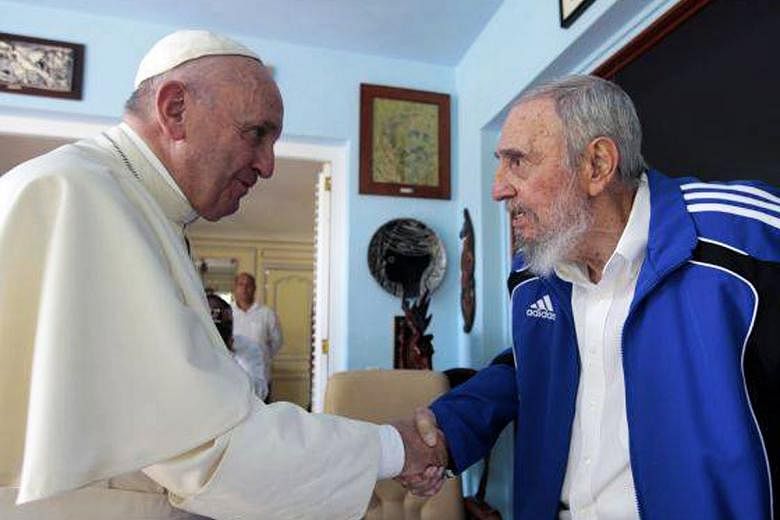HAVANA (AFP) - Pope Francis on Sunday (Sept 20) met Fidel and Raul Castro, the brothers who have ruled Cuba since its 1959 revolution, after celebrating an outdoor mass attended by hundreds of thousands.
In what is sure to become an emblematic moment of Pope Francis's tour of Cuba and the United States - the Cold War enemies whose reconciliation he helped to bring about - he chatted with former leader Fidel Castro at his home in Havana, then held a closed-door meeting with current president Raul at the government's headquarters.
Vatican spokesman Federico Lombardi said the Pope had a "very informal and friendly" conversation with 89-year-old Fidel Castro that touched on various topics, including the environment.
Pope Francis, 78, gave the former Cuban leader four books, including two on theology.
Mr Castro reciprocated with a dedicated copy of Brazilian priest Frei Betto's book of interviews with him, Fidel and Religion, which he signed "With admiration and respect from the Cuban people".
After years of hostility between the Church and Mr Castro's communist regime - which was officially atheist for more than three decades - relations began to slowly improve in the 1980s, culminating in a historic visit to Cuba by then Pope John Paul II in 1998.
Pope Francis is now the third pope to visit the island, after his predecessor Benedict XVI travelled there in 2012 - a remarkable amount of papal attention for a country where only 10 percent of the population describe themselves as Catholic.
Pope Francis later met Mr Castro's brother, President Raul Castro, 84, who took power when Fidel stepped down amid a health crisis in 2006.
Before the meetings, the Pope gave a homily in Havana's Revolution Square, calling on Cubans to serve the downtrodden and warning them that "service is never ideological", in what appeared to be a veiled critique of the communist regime.
"Christians are constantly called to set aside their own wishes and desires, their pursuit of power, and to look instead to those who are most vulnerable," he told the crowd, speaking beneath a towering sculpture of his fellow Argentine Che Guevara's iconic silhouette.
"We need to be careful not to be tempted by another kind of service, a 'service' which is 'self-serving'."
Three Cuban dissidents opposed to the communist regime were arrested as they approached the Pope shouting "Freedom!" when he arrived for the mass.
An AFP photographer said the activists - two men and a woman - yelled anti-government slogans and resisted arrest as plainclothes agents detained them when they tried to get near the white popemobile.
The Pope, who was busy grasping the outstretched hands of well-wishers on the other side of his vehicle, did not appear to notice.
The protesters were from the Cuban Patriotic Union and "went to the square to condemn repression", said Mr Jose Daniel Ferrer, the leader of the dissident group.
Cuba bans opposition groups and routinely arrests dissidents who try to protest - typically releasing them after a few hours, at least in recent years.
Several leading dissidents have criticised the Pope for not accepting their requests to meet him during his visit.
The mood was otherwise jubilant in the packed square, where hundreds of excited Cubans and foreign visitors camped out overnight to see the first Latin American pope.
Pope Francis's lone explicit political message was aimed at a Latin American audience: the Colombian government and FARC guerillas, who have been holding peace negotiations in Havana for nearly three years.
The Pope urged them to end a conflict that has burned for more than half a century, saying Colombia cannot afford "yet another failure". The Pope will later preside over vespers at Havana Cathedral before holding an unscripted exchange with young Cubans - a demographic feeling the pain of the communist island's difficult economic transition.
He will travel on Monday and Tuesday to the Cuban cities of Holguin and Santiago, before heading off to give landmark addresses to the US Congress and United Nations General Assembly.

